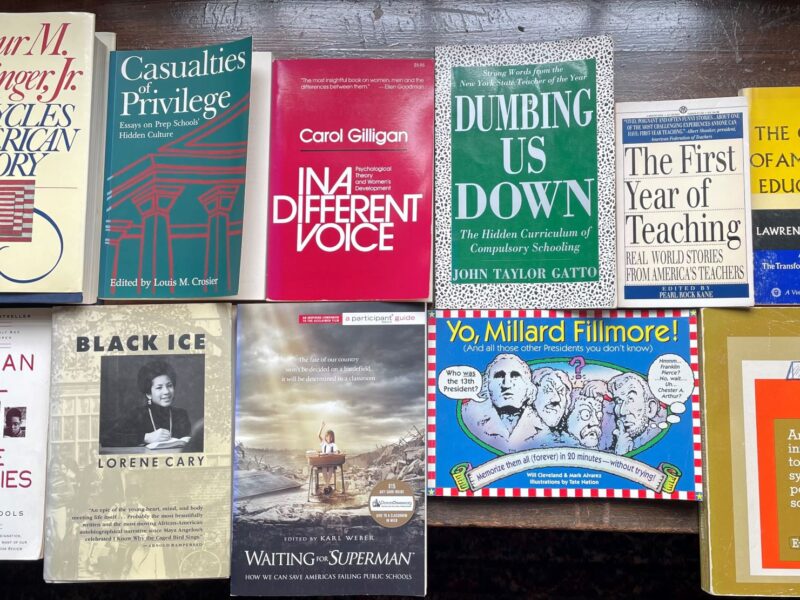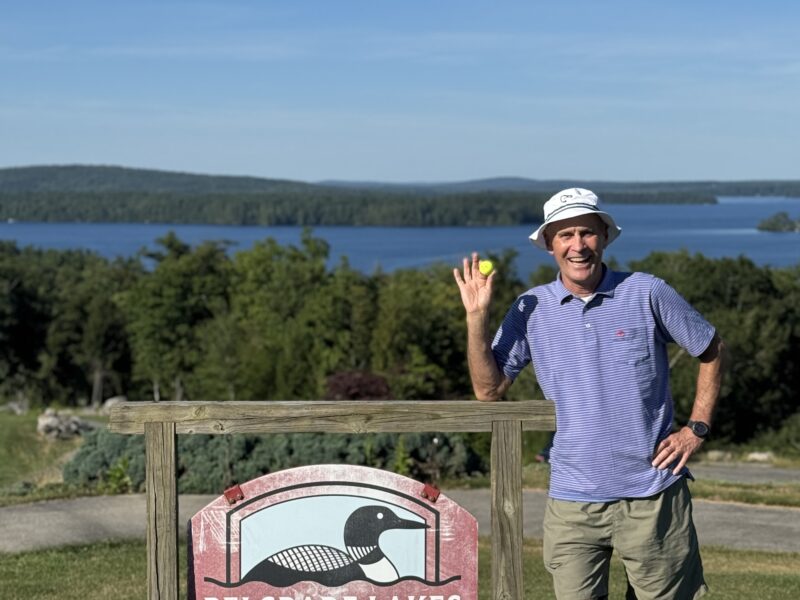If you have been around Hyde for any length of time, you may well have heard someone say, “School is for kids; Hyde is for families.”
You might even have heard, “Parents are the primary teachers and home is the primary classroom.”
And while I’d bet money that you have heard various people claim that “the apple does not fall far from the tree,” you may have missed hearing them add under their breath, “… and neither do the nuts.”
In any case, this weekend finds students and parents coming together in the first of two annual Family Weekends where Hyde serves as the secondary classroom with the goal of improving life in the primary one.
In my experience, students and parents typically face two unique (to each group) obstacles to significant progress.
Student Obstacle #1: “Life is Hard”
Scott Peck (1936-2005) opens his 1978 book The Road Less Traveled with this statement:
Life is difficult. This is a great truth, one of the greatest truths. It is a great truth because once we truly see this truth, we transcend it. Once we truly know that life is difficult – once we truly understand and accept it – then life is no longer difficult. Because once it is accepted, the fact that life is difficult no longer matters.
If Peck is too heavy for you, consider what Justice Louis Brandeis (1856-1941) once said to a whining granddaughter: “Your problem, my dear, is that you do not accept that life is difficult. If you would simply accept that it is difficult, it would be so much easier for you.” As Brandeis intimated, the tendency to hold onto the hope that life could be easy only makes it harder. This difficulty can add up to a delayed gratification bottleneck on the road to character development. Is your child stuck in traffic?
Student Obstacle #2: Brother’s/Sister’s Keeper (B/SK)
Whereas new Hyde students typically regard B/SK as a negative “snitch system,” wily veterans perceive it as perhaps the most critical ingredient in a healthy school culture. Bottom line: If you do not have a strong B/SK ethic, you will not generate the vibrant inspiring communal synergistic force necessary for substantive character development.
The primary purpose of B/SK is to create a community of people who care for each other, who make it safe, and indeed an expectation to take risks and commit to one’s personal best. In a B/SK community, working hard and taking risks is cool. While most kids start out with a distaste for B/SK, they become ardent advocates once they accomplish something that they did not think they could accomplish and they make the connection between that accomplishment and B/SK.
One of the reasons kids balk at B/SK is because they often miss its edgy irony: An unpleasant bouquet followed by a forgiving finish. (True Story: Many years ago, we were visited by the headmaster of a highly prestigious boarding school. At the end of his visit, he said to me, “You know, we’ve all heard stories of Hyde’s harsh disciplinary practices. However, today I learned that this is one of the most forgiving schools I have ever seen. It’s far more forgiving than my school!”)
B/SK is so alien to the culture common to the standard American high school — public or private — that many students (and even parents) fail to grasp and appreciate one of its greatest assets: the problems that a B/SK culture does not have. Full Disclosure: Hyde’s B/SK culture is a work in progress, stronger at some times than at others. (I liken it to the golfer’s quest for par.) However, a strong B/SK culture naturally drives out major problems like bullying, substance abuse, sexual abuse, racial insensitivity, and more. That is because it serves as an antidote to the underground culture necessary for those problems to thrive. Hence, some of B/SK’s greatest fruits go unnoticed despite existing in plain sight.
Parent Obstacle #1 – Letting Go
The recent College Admissions Scandal is reflective of the current all-too-common parental impulse to prepare the proverbial road for the kid as opposed to preparing the kid for the road. Today’s parents are engaged (and for some, “engaged” is a polite way of saying it) in their children’s affairs and challenges to an extent I could never have imagined when I assumed my first teaching post in 1976. As a result, the demarcation line delineating who-is-responsible-for-what regarding personal and family obligations has never been as blurry, varied, or inconsistent as it is today. Not only is this phenomenon the biggest change I have seen during my career, it shows no signs of abating.
Furthermore, this phenomenon is not a new development. In fact, ten years ago, not only did I write a review of Hara Marano’s excellent 2008 book Nation of Wimps – The High Cost of Invasive Parenting (see link below), we had Dr. Marano address Hyde’s parents as a guest speaker at a Hyde Family Weekend.
Parent Obstacles #2 – Looking at Self
The second parental obstacle springs from the intense pressure we parents feel “to have it all together.” In today’s achievement and success culture, parents can be gripped by a strong compulsion to present themselves as beacons of strength, unfazed by life’s challenges. The main problem with this is simple: It is a lie. And it is a lie that shows the world as a mirage to our children, thereby providing fuel to the above Student Obstacle #1.
In her 2018 book Small Animals – Parenthood in the Age of Fear, Kim Brooks likens contemporary parenting to a competitive sport, one that no one admits to playing. And, she writes, “It’s hard to win while pretending not to play.” Here is the link to my review of Small Animals:
https://hydeschoolstg.wpengine.com/blog/malcolms-blog/small-animals-parenthood-in-the-age-of-fear/
As a parent in a school committed to family-based character education – Our daughters attended Hyde from 2004 thru 2010. – my own Hyde experience helped me realize that I had perpetrated a façade of impenetrable “confidence” that had caused my daughters to erroneously conclude, Dad seems to have it all together in every situation. Since I do not have it all together in every situation, there must be something wrong with me. Think I’ll keep that to myself. In other words, my children were doing the same thing that I was doing! Once I became honest about my own fears and my worries, my daughters could then feel normal about their everyday fears. We then challenged and supported each other in honest and open fashion. Hopefully, that can happen for you this weekend.
Finally, beyond “leave your golf clubs at home,” a piece of advice for new students and parents unfamiliar with Hyde’s decidedly unconventional approach to the very notion of Parent’s Weekend. Simply put, avoid trying to do Hyde and evaluate it at the same time. Do it in earnest for a while and pick a date out in the future where you will assess its value to your life, your child’s life, your family’s life. Regardless of whether you find it awesome or awful in the early going, make like Nike and Just Do It for a predetermined span of time.
In the spirit of just doing it, a story about Winston Churchill: A young man who was applying for a job with Churchill was waiting nervously in the reception area outside his office. Sensing the applicant’s nervousness, the receptionist calmly said to him, “Before you go in there, know that all of Winston’s faults will be obvious to you in the first five minutes of meeting him. It may take you a lifetime to fully comprehend and appreciate his strengths.”
Reminds me of Hyde School.
Onward, Malcolm Gauld
PS: And 1 more thing… If you parents are wondering what we’re telling your kids to do here in the secondary classroom while you’re managing the primary one in your respective locales, here is a link to one of my annual harangues. Although directed primarily at our seniors, it will hopefully give you some insight into out perception of the end game as it relates to their Hyde careers:
https://hydeschoolstg.wpengine.com/blog/malcolms-blog/4-points-for-seniors/
PSS: Link to review of Hara Marano’s Nation of Wimps:
https://hydeschoolstg.wpengine.com/blog/malcolms-blog/doorknob-3/


